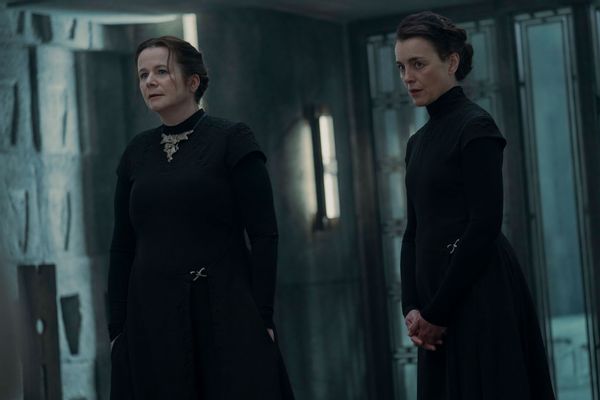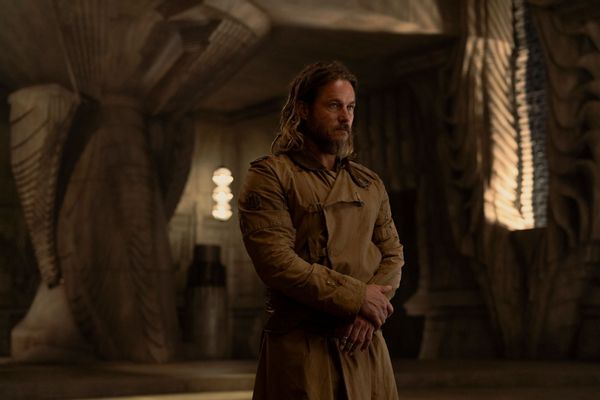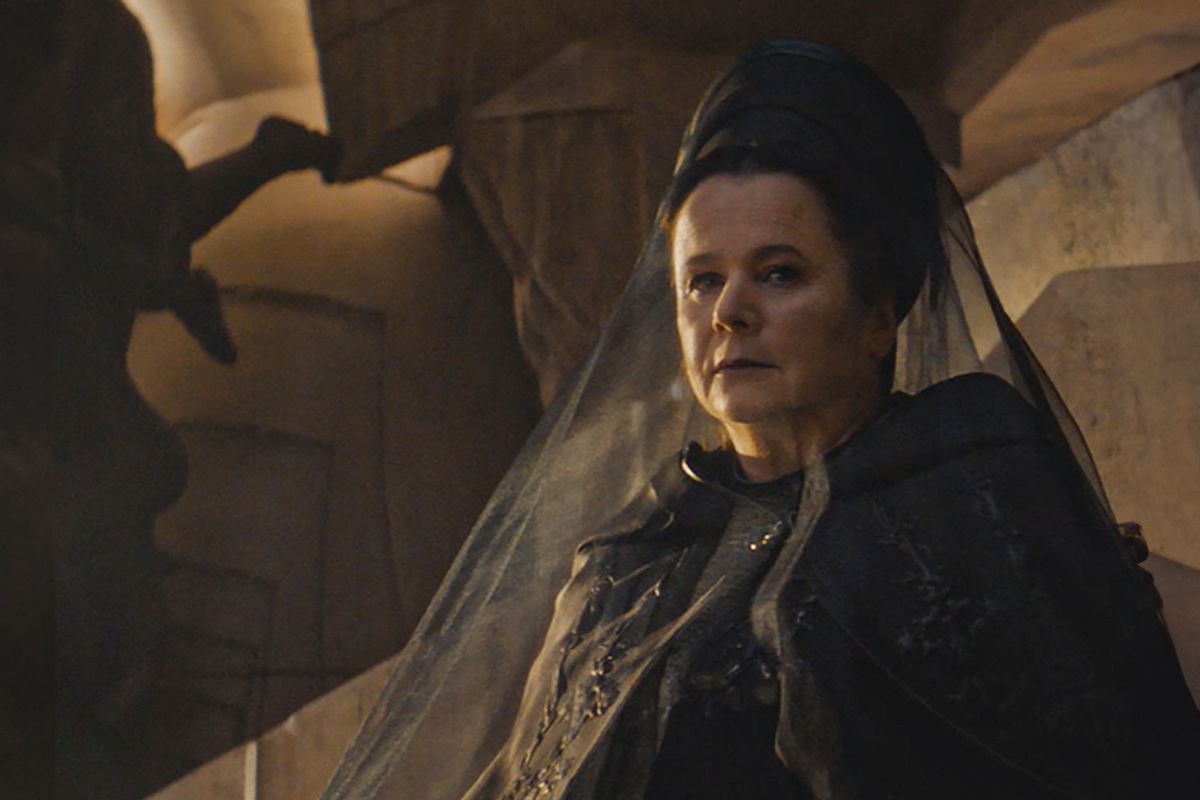What “Dune: Prophecy” offers on its face is bound to appeal to women who are sick of everything. Given the present circumstances, who wouldn’t want to escape into a universe where women could leave their inferior situation and join the Bene Gesserit, “a new family made up of women unafraid of their power”?
Although they dress like nuns styled by Jean Paul Gaultier and hold titles like Reverend Mother, they adhere to a regimen of martial arts training and learn how to be living lie detectors. By sorting truth from deceit, holding the adage that humanity’s greatest weapon is the lie, the Sisterhood wields influence throughout the galactic Imperium by inserting their representatives at the side of every ruler.
While that may not quite be “the dream,” a functioning stable society shadow-designed by women to sensibly govern the future sounds grand. Then we look at the fine print.
The Sisterhood engineers bloodlines, manipulating matches between great houses to cultivate leaders the Bene Gesserit can control, thereby influencing the flow of power. Any marriage “choice” between nobles is an illusion. The person setting all this in motion is a Harkonnen, a name associated in the movie “Dune”-iverse with violent strongman rulership and all-purpose villainy.
It will be 10,000 years before the story reaches that inflection point with, I’m sure, many head-scratching twists and turns along that road that this series never has to deal with. The task before it is daunting enough, the same as every director and screenwriter had to confront when adapting Frank Herbert’s opus. Winning over audiences to these stories requires striking a balance between clarity and complexity without oversimplifying its dizzily complex politics and mythology.
Herbert wove a complicated universe with oddball technologies, bizarre competing factions and religions that are easier to digest over the methodical consumption of hundreds of pages. Denis Villeneuve conveyed the gist over the space of a couple of hours, aided by an impressive blend of sound and visual editing and cinematographic sorcery.
“Dune: Prophecy,” a prequel based on Brian Herbert and Kevin J. Anderson’s “Great Schools of Dune” trilogy, has about six hours to set the table and whet our appetite. Within the four shared with critics, showrunner Alison Schapker, who developed the adaptation with Diane Ademu-John, proves equal to that task.
“Dune: Prophecy” continues HBO’s thematic streak of examining human nature from the heights of wealth and influence.
“Prophecy” sweeps us back to a long-ago time before Paul Atreides was a thought, although we quickly understand how the rivalry between his house and the one built by Valya Harkonnen began.
The six-episode series moves between the start of Valya’s rise within the Bene Gesserit, when she’s played by Jessica Barden, and 30 years hence, when Emily Watson portrays her as a seasoned Mother Superior.
Neither soft-sells Valya as sympathetic or even justified in her iron-fisted quest for supremacy; Barden’s version dispenses with an influential voice of opposition swiftly and cruelly soon after the mantle of leadership passes to her by the Order’s founder. The daughter of a disgraced house, Valya isn’t content to accept her family’s banishment to a life peddling whale fur and blubber.
Decades later Watson’s Valya is icy and entrenched in her seat of power with her loyal sister Tula (Olivia Williams) as her right hand. She bestows Truthsayers to select houses and denies others, including her own.
 Emily Watson and Olivia Williams in "Dune: Prophecy" (HBO)Watson's and Williams’ portrayals present the sect’s bloc as preferable to the chaos brewing in the Imperium threatening the rule of House Corrino under Emperor Javicco (Mark Strong) and Empress Natalya Arat (Jodhi May). Another unforeseen challenge emerges by way of a soldier who survives an assault on Arrakis, Desmond Hart (Travis Fimmel) whose true aims are cloaked from everyone, including the all-seeing sisters who read him.
Emily Watson and Olivia Williams in "Dune: Prophecy" (HBO)Watson's and Williams’ portrayals present the sect’s bloc as preferable to the chaos brewing in the Imperium threatening the rule of House Corrino under Emperor Javicco (Mark Strong) and Empress Natalya Arat (Jodhi May). Another unforeseen challenge emerges by way of a soldier who survives an assault on Arrakis, Desmond Hart (Travis Fimmel) whose true aims are cloaked from everyone, including the all-seeing sisters who read him.
“Dune: Prophecy” continues HBO’s thematic streak of examining human nature from the heights of wealth and influence, assuming its audience gleans joy from watching the rich cannibalize each other.
With “Succession” gone the premium cable channel needs something to fill the yawning space between seasons of “House of the Dragon.” A facile “Prophecy” reader might joke that the channel is substituting spaceships for dragons.
But there are similar allegorical tests at play within these episodes. Herbert’s novels came before George R.R. Martin published a letter concerning Westeros. Each franchise examines the corrosive nature of power when it’s consolidated into an insulated ruling class or, worse, one ill-suited custodian. Brian Herbert’s prequels may have only come out a few years ago, but his father planted his banner on that allegorical field first.
Since most viewers will come to “Dune: Prophecy” without having read these books, and possibly before watching Villeneuve’s movies, what matters most is the look and feel of it. The set design and especially the costumes are stunning, especially those of the Corrino clan; the home base of the Bene Gesserit is a palate of severe black and grays occasionally interrupted by white, for a change of pace.
Salusa Secundus, the Imperium’s seat, resembles a cross between a “Blade Runner” red light district and a Florentine court when the Medicis were running the show.
 Travis Fimmel in "Dune: Prophecy" (HBO)Strong is in his element as a ruler who isn’t quite certain of how to handle the brewing insurrection among the ruling classes — or Desmond Hart, who Fimmel plays with his usual feral unpredictability. Between his role in “Vikings,” “Raised by Wolves” and this, one gets the sense that the actor has less range than a specifically wacky type or part he commits to better than anyone else, and as long as it works, we’re not complaining.
Travis Fimmel in "Dune: Prophecy" (HBO)Strong is in his element as a ruler who isn’t quite certain of how to handle the brewing insurrection among the ruling classes — or Desmond Hart, who Fimmel plays with his usual feral unpredictability. Between his role in “Vikings,” “Raised by Wolves” and this, one gets the sense that the actor has less range than a specifically wacky type or part he commits to better than anyone else, and as long as it works, we’re not complaining.
We need your help to stay independent
His off-kilter demeanor looks especially dangerous in scenes he shares with Strong or May, whose Empress is stealthier than the strutting warrior she showcased in “The Witcher.” All of them leave more of an impression than their daughter Princess Ynez (Sarah-Sofie Boussina), in whom the Sisterhood places its trust because Valya believes they can steer her to the throne.
Winning over audiences to these stories requires striking a balance between clarity and complexity without oversimplifying its dizzily complex politics and mythology.
A certain popular dragon drama has a few lessons about such ambitions, along with explaining our recent election results. Either way, the Sisterhood’s aims are one of many colliding schemes and plans. I haven’t even gotten to the jockeying among the Bene Gesserit acolytes, four of whom are further developed after the first episode in ways that are welcome though not quite adequate to foster much of an emotional connection.
The shortcomings of "Dune: Prophecy" are akin to the obstacles typical of most Herbert adaptations — sprawl is the mind-killer, not fear. This isn't an easy story to commit to screen economically, and while the production design is lush and realistic (save for one obviously waxy cadaver mannequin), one quickly get the sense that six episodes isn't enough to give every subplot's thread and minor character their due.
Plus, coming into “Dune: Prophecy” as a stone-cold uninitiate is a challenge for which the script compensates using a combination of summary via narration and a brief, expository title card. The writers prudently refrain from dropping woo-woo terms like "prana-bindu" and other “Dune”-specific terminology and have the good fortune of operating in a timeframe long before phrases like the Kwisatz Haderach were tossed about like so much popcorn. (I mentioned a couple of descriptive phrases into Salon's workplace Slack and was met with the response, “I do not know what any of those words mean!”)
Want a daily wrap-up of all the news and commentary Salon has to offer? Subscribe to our morning newsletter, Crash Course.
The benefit of being the first generation into a psychic sect is that there’s a lot they don’t or cannot know yet, which I’m guessing makes it somewhat easier on the poor scribes trying to figure out how to jam the legend of the giant worm god into naturalistic dialogue.
Instead we have understandable stakes revolving around a struggle pitting an unpredictable prophet figure against a controlling matriarchy, coupled with a subplot concerning an Imperial ban on “thinking machines” a little more than a century after breaking free of their dominion. A.I. debates: can we ever escape them? A show investigates. Sort of.
The thinking machine storyline lurks in the background of the episodes provided for review, which is forgivable considering everything and everyone else Schapker and her team must introduce. And yet, we’re also sidetracked to a few nightclub scenes so we can meet a few rebels and a Fremen bartender (Shalom Brune-Franklin), and watch Princess Ynez and her brother Constantine (Josh Heuston) clandestinely get down with the hoi polloi and the help.
A little romping is welcome within a story this dark and serious, and across the board the performances sell it. Such detours are part of the production’s meticulous efforts to grab and keep our attention, rewarding us for watching closely. The gorgeousness and scope showcased in its opening hours hints that won’t be a challenge or a burden.
"Dune: Prophecy" premieres at 9 p.m. Sunday, Nov. 17 on HBO and streams on Max.



Shares